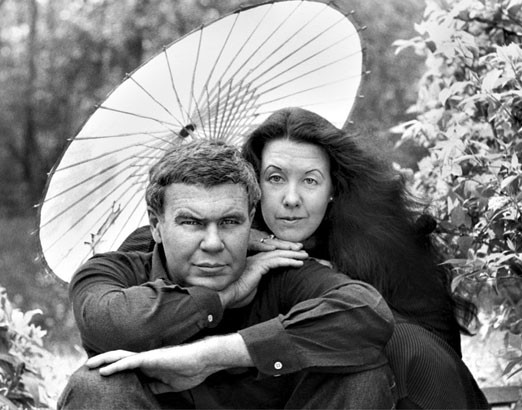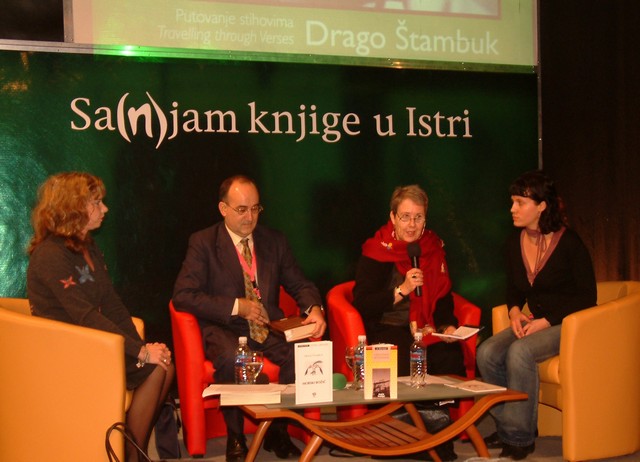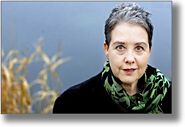Tess Gallagher's speech at a presentation of Drago Stambuk's poetry in Pula
http://www.croatia.org/crown/articles/9432/1/Tess-Gallaghers-speech-at-a-presentation-of-Drago-Stambuks-poetry-in-Pula.html
By Nenad N. Bach
Published on 01/14/2008


 | Once I heard Drago read to a Croatian immigrant audience in Vancouver, Canada. It was so tender, the timbre of his voice, that it was as if he were speaking to the listeners in a clearing in the woods, surrounded by mystery and wildness and beauty, but giving them comfort too... - Tess Galagher (left) |
Croatian became for me the language of YES with a secret NO inside it
I met a small island of Croatian language lodged in a very old woman, the grandmother of my husband-to-be

Tess Gallagher (on the right) and Raymond Carver
Tess Gallagher's speech at 2004 Pula Book Festival's presentation of Drago Stambuk's poetry In 1961 or 62 I met a small island of Croatian language lodged in a very old woman, the grandmother of my husband-to-be. When I met her he warned me: whatever she says, just say yes. If you say no, we'll have to explain. I accepted these terms of meeting because she made me a little afraid. She was intense like a bolt of lightning that had made a pact not to burn anything down or strike anyone dead - for the moment at least! At the same time she seemed lost, isolated and my heart went out to her immediately, despite my fear of her. Croatian became for me the language of YES with a secret NO inside it. A mysterious island of "yes" fringed with the unsay able NO. These were the only words of English this grandmother allowed. She spoke only in Croatian - no matter the tide of English crashing at the shores of her days and nights. In 1961 or 62 I met a small island of Croatian language lodged in a very old woman, the grandmother of my husband-to-be. When I met her he warned me: whatever she says, just say yes. If you say no, we'll have to explain. I accepted these terms of meeting because she made me a little afraid. She was intense like a bolt of lightning that had made a pact not to burn anything down or strike anyone dead - for the moment at least! At the same time she seemed lost, isolated and my heart went out to her immediately, despite my fear of her. Croatian became for me the language of YES with a secret NO inside it. A mysterious island of "yes" fringed with the unsay able NO. These were the only words of English this grandmother allowed. She spoke only in Croatian - no matter the tide of English crashing at the shores of her days and nights. I recall seeing a newspaper in the Croatian language spread out on a table near her bed. It ratified the fact that she had come from that far away place she had never intended to leave and with the utmost effort every day she lifted all of America and carried it back to Croatia for a look at how the world really was. I read a poem of Drago Stambuk's last night that so reminded me of this woman whose name I'm sorry, I can't even give you - because I was young and stupid and in love and could only take in things for greedy reasons and not as gifts to bestow later. (Read Drago's poem "1918") My husband-to-be was half Croatian and half Irish. Since I am part Irish I connected very well with this Irish part. His mother was Croatian and one of the most generous, loving people I would ever meet. But she suffered from a mental disorder and would go into states of catatonia after times of manic behavior. No one know what to do. They eventually put her into an institution and I would sit in the car while my young husband, by that time, would go bravely inside to see her. He didn't want me to have to bear what went on in there, so I sat in the car and gazed up at this brick, prison-like structure. He would always come out very saddened and heavy and helpless seeming. So this island nature seemed to have claimed both his grandmother and his mother, who would sit without speaking for days, until they applied electroshock and brought her, forced her, to come back. This mother of my husband worked, when she was well enough, as a waitress in the main hotel in Aberdeen, Washington on the West Coast of America. She knew everyone in the town, was kind and welcoming to everyone, serving them coffee and pie, soup and hamburgers. But she had lost her Irish husband, Mikie Gallagher, before I had met her. He had drowned after falling off a dock in an alcoholic haze. My husband, who was not yet my husband then, had jumped into the water to retrieve his father, had managed to pull his dead body back to shore. Tragedy and love. A mother alone, raising her son. So I became a kind of daughter and solace to her and to her son who had suffered very much by the time I met him. He was my first love: very striking with eyes like blue-ice and a white shock of grief in his jet black hair at the age of 22. We were together ten years, part of which was given over to the Vietnam War in which my husband was a Captain who flew jets in the Marine Corps, strafing and napalming and doing so much damage which he hated, that he never recovered from the digest of these actions. I could say so much about this time, but it would carry us far away from the delight of this occasion of being here in Croatia at last. Suffice it to say that when my marriage ended to my half Croatian, half Irish husband, I promised to keep his name forever. And so I have. The name "Gallagher" is on all my poems and inside the Gallagher is a mysterious unknown Croatian identity that I nonetheless also have kept tight in my grasp. This "keeping" became possible when I met Drago Stambuk in London at Doris Lessing's garden party in 1984. Ray had met Ms. Lessing in Australia and she had gathered many of her friends to meet us. Drago was one of these friends. It was strangely as if I'd always known him when we took each other's hands. Who can account for these things? The gift of friendship that seems to be a taking up of some closeness we have always known, but been separated from and now regain. He and I could speak in the most frank, open way - like two children building a bonfire in the forest to keep warm. I felt immediately beloved and warm in his presence. Later, his voice would always comfort me on the telephone and we always rang each other in mid summer, at Christmas or New Year or Easter, especially Easter. I remember so many exuberant walks and talks - some with Raymond Carver who was my husband by then and with me when Drago and I met. Ray was shy at first, but he too loved to be in Drago's company with me. I read some translations of one of Drago's poems to Ray once and I recall how impressed he was, for he had an instinct about poetry and loved it really more than prose. "He's a real poet!" Ray exclaimed of Drago. Ray did not live to know about the war brought about in Croatia. He did not hear Drago singing the song he'd written to mourn the bombing of Vukovar - singing it to me heartbreakingly on the telephone while the bombing was still going on. In that song I could feel acutely his pain for this place and its people. He told me things, the inside of certain horrors of war, and I became more connected through those pains. I sent money for refugees when Drago became the first Croatian Ambassador to England. Before Croatia could get its stature as a separate country again, certain powers had to support that. One of those was America. I began to write and call my congressmen and senators. Ultimately I constructed a petition which many important writers signed - among them Robert Haas and Czeslaw Milosz. But many others. I sent this petition to Congress and to the Senate. The process was unbelievably slow and reluctant as compared to Slovenian recognition. I believe my efforts may have helped in a small way. At one point I was even speaking on Croatian radio from my kitchen - trying to tell the Croatian people that one American poet and her writer friends cared about their suffering and their wish to find definition politically that might be a protection and a way to regain autonomy and go forward again as a nation. To go forward to heal, to reclaim the best elements of life after a cruel time. I kept a scrapbook of all the articles that appeared in American newspapers during this war time. Strangely the war had been misrepresented as an ethnic infighting and this allowed America to stand aside, letting the war continue without intervention - while the world became a spectator, waiting to see, as in a school yard brawl, if the bully would win. So as they say, the rest is history. Force only wins in the short term though a long time must often be spent to redress all the pain wars cause. I recall saying to Drago once after he returned to Croatia from his post as Ambassador to Egypt: why don't you make a garden in Croatia dedicated to healing differences and wounds from this time? Everyone could come together to make it. A place to sit and be with trees and water and flowers and stones. My dream: a peace-garden. I don't know if it will ever happen, but at least I could suggest it and we could imagine it for a moment together: that's what friends are for, after all, being able to imagine important things together. All this by way of saying I'm here in Croatia because another dream Drago and I had actually came true: thanks to this occasion in Pula and to my editor and translator at VBZ who brought my book, Carver and Me, into Croatian allowing me finally carry the story of a literary and passionate companioning in my relationship to the great international short story writer and poet, Raymond Carver. Thanks to this publication I can celebrate not only my own book, but my long deep friendship with Drago Stambuk. Without him so many blessings would never have reached me, both as a writer and a person. I once had the privilege to publish some English translations of Drago's poems in an issue of Ploughshares. I introduced them this way: Once I heard Drago read to a Croatian immigrant audience in Vancouver, Canada. It was so tender, the timbre of his voice, that it was as if he were speaking to the listeners in a clearing in the woods, surrounded by mystery and wildness and beauty, but giving them comfort too. That's why it's true I said to him that I wished he could be at my bedside when I'm dying: to read those poems in Croatian, although I know only a few words now, thanks to coming here, and knew nothing of Croatian at the time I said this to him. I want to read one poem in flatfooted English just so you can hear, when Drago reads, how much more delicious it is in Croatian. In the margin last night I wrote: it is so bereft and open with smothered pain. It makes one feel acutely the pain of lost love: the ending feels so startlingly true. For Lousie Bogan is right: if the poem does not make one feel, it is nothing. (Read poem) At lunch today Drago spoke of having been in the training for the army in Pula and how after leaving he'd translated Herman Hesse's poetry. It was an antidote to the army perhaps. He remarked that Hesse's poetry was as clear as water and one drank it as eagerly as water. Drago's poetry is mysterious. It is not clear as water. But it makes you thirst for the intensities of life, of spirit and embodied life of which the poems give evidence. They are like well water, refreshed by darkness, a round darkness above and below, refreshed by our reaching toward them. At times it seems as if the world wants to hold us back from tenderness. This makes one thankful for every person who allows that garden in us to bloom, who doesn't trample that garden of tenderness. Drago Stambuk is for me just this person, both in his being and in his poetry, who allows a plenitude of human tenderness - who gives it and is able to receive it. I am the luckiest of poets and of persons to have met him. Our friendship has sustained me through so much - the death of my beloved husband, my own serious breast cancer fight for the past three years, and this joy of welcome in his birth place, Croatia. Thankfully I am getting more access to his poems through some recent English translations. Still, while in America, I can almost feel him to be my own private discovery. I am sure this will not be the case for long. Soon I will happily share him with other lovers of poetry there as I share him with you here in Pula. Thank you for your gracious reception of me. For honoring both Raymond Carver and Drago Stambuk in our public and private occasions in this beautiful sea port. As I walk here I keep thinking: how Ray would have loved to be here! How he would have found it so meaningful to have his photo taken near the statue of James Joyce whom he revered so deeply. Please know that when I leave, I will carry this time back with me and savor it in my own sea port of Port Angeles. Tess Gallagher, Pula, Dec 2004 |

Dr. Drago Štambuk with Tess Gallagher, Milana Vuković-Runjić and Egle Vosten in Pula, December 2004.
June 26th, 2007 Choices I go to the mountain side of the house to cut saplings, and clear a view to snow on the mountain. But when I look up, saw in hand, I see a nest clutched in the uppermost branches. I don't cut that one. I don't cut the others either. Suddenly, in every tree, an unseen nest where a mountain would be. for Drago Stambuk - Tess Gallagher Source: delicata77.livejournal.com |
| TESS GALLAGHER Tess Gallagher's new collection of poems, Dear Ghosts, has recently been accepted for publication by Graywolf Press to appear Spring 2006. Her essays and interviews amounting to a literary portrait of her relationship with Raymond Carver appeared as Soul Barnacles, Ten More Years With Ray, from University of Michigan Press in paperback in 2003. She visited Pula, Croatia, where she welcomed the Croatian translation of this book in December 2004 at the Pula Book Festival for which she was the lead-off speaker. She continues to work on a book of Irish oral stories with painter/storyteller Josie Gray of Sligo, Ireland, some of which appeared in DoubleTake along with an interview of Gallagher. Other tales from the collection appeared in Hayden's Ferry Review, The Artful Dodge and The Bellingham Review, some with artwork by Gray. In May 2004, Gallagher was awarded an honorary Doctor of Letters from the University of Hartford, the Alumna of the Year Award from the University of Washington and the John Terrey Award for Excellence in the Humanities. She is the sole caretaker of her 90-year-old mother in her home in Pt. Angeles, Washington. Source: www.blackbird.vcu.edu |
Formated for CROWN by prof.dr. Darko Žubrinić
Distributed by www.Croatia.org . This message is intended for Croatian Associations/Institutions and their Friends in Croatia and in the World. The opinions/articles expressed on this list do not reflect personal opinions of the moderator. If the reader of this message is not the intended recipient, please delete or destroy all copies of this communication and please, let us know!